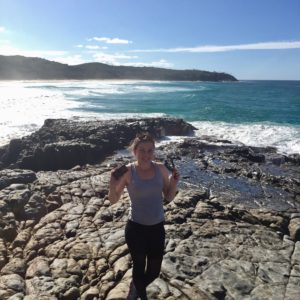You’ll probably be surprised to know that until very recently I was terrified of needles. Not the “this makes me really uncomfortable and a bit freaked out” kind of terrified, either. I have prepared for blood tests with tubes of numbing cream, scrunched my eyes closed as the blood was drawn, and (as a grown adult) been prone to cry like a baby after the flu injection. If there were such a thing as an ideal candidate for diabetes, I certainly wasn’t it.
So when those dreaded words leapt from the doctor’s mouth, they didn’t just hit me hard—they knocked me to the ground and ran me over.
If you are a regular around here, you will know diabetes isn’t my only chronic condition—but at the time of my diagnosis, it was the one that felt like a death sentence.
The prospect of injecting myself every day for the rest of my life was devastating at best. I couldn’t even digest the meaning of the other potential complications. I felt that my world (and life) had been further taken out of my hands and had been placed in the control of the dreaded D-word. In my mind, diabetes meant a life of restriction and a daily reality of the thing I dreaded most: needles.
As I was thrown into the grief that comes with diagnosis—mourning a life I thought could never be the same again—my coping instinct lulled me into being content with knowing as little about the condition as possible. There was safety in the unknown; from there, it couldn’t get worse. What I did know about diabetes came from TV shows, stories about friends of friends, and the stuff you learn at school. Most of it was outdated or inaccurate; and, more significantly, none of it filled me with hope.
Amid my fear and overwhelm, I didn’t consider that in learning more, I would actually be taking back the control of my life I felt my diagnosis had taken away.
I spent four years trying to skate precariously around the the need for proper diabetes management. Unconsciously, my approach was that the less I acknowledged I had diabetes, the less it could impact my life. Despite their reluctance, my medical team supported me in trying almost the entire suite of non-injectable medications in the hope I wouldn’t have to face that thing I was so afraid of. Initially, each of them worked well enough to keep me out of any immediate risk, but for my unique type of diabetes, it certainly wasn’t considered best practice.
My fear of what I thought diabetes looked like was preventing me from making the decisions that would best serve my body.
I wish I had been able to see that sooner but, in all honesty, it was a realisation that I had to come to myself. The power diabetes had to impact my life largely depended on my willingness to take ownership of my diagnosis. Denying my diagnosis did not make it or the effects of it go away; ignoring the condition was in no way the same as beating it. Instead, I had to acknowledge the condition I now lived with.
In that realisation, I found the strength I needed to move from my overwhelm. Gradually, I drew inspiration from other patients; found professionals who I felt were the most suitable to guide me; realised that what I ate could become freeing, not restrictive, in my management and discovered the medications that worked best for me. And, yes, very slowly I realised the needles weren’t as scary as I had imagined—in fact, they were an act of commitment to my future. Contrary to my fears, in learning more about the condition, I could take ownership of my care and take back the control of my life I felt diabetes had taken away from me.
I would be lying if I said there weren’t days that diabetes tests me to the core, days where despite my best efforts I can’t steer the roller coaster, and the fear tears flow. However, I have learnt that accepting these things is just part of living with this disease, and beating up on myself doesn’t change the situation. Importantly, with time, knowledge, and the right support, managing diabetes does get easier.
A diabetes diagnosis is an overwhelming and terrifying time. There is no denying the severity of the condition. However, diabetes and its management is unique to each patient. Although my fear might have been real and valid, allowing it to dictate my approach to care didn’t make my experience at all easier. Accepting my needs after diagnosis did not break me as I believed it would, but proved to be the strength and freedom I feared diabetes had taken away. In finding the courage to face my fear, I learnt the words I wish I had heard upon diagnosis:
diabetes does not have to be a death sentence.









You must log in to post a comment.